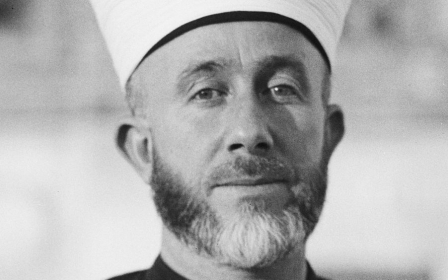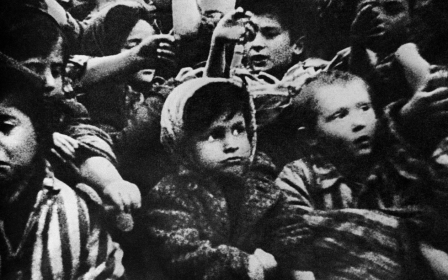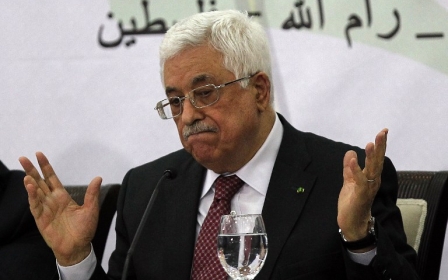French Jews angry at Iran president visit coinciding with Holocaust memorial

Iranian President Hassan Rouhani's trip to France has come under fire from the French Jewish community as it falls on Holocaust Memorial Day.
The visit by President Rouhani is aimed at rebuilding political and economic ties following years in the wilderness under the sanctions regime.
However, the timing of the event has angered some in France’s Jewish community, as it coincides with Wednesday's commemorations marking the liberation of the Auschwitz concentration camp by the Soviet Red Army in 1944.
The director of the American Jewish Committee’s Paris-based Europe office, Simone Rodan-Benzaquen, condemned the visit, saying it showed the Iranians had a “dark sense of humour”.
“As President Rouhani prepares for his morbidly timed visit to Paris, it is important to recall the words of his predecessor, Mahmoud Ahmadinejad, who repeatedly declared the Holocaust ‘a myth’ and said that the State of Israel should be ‘wiped off the map’ - remarks that the current Iranian president has never contradicted,” he wrote for Fox News.
He highlighted that Iran was also once again running a Holocaust cartoon competition in June, purportedly under the title “Did the Holocaust really happen?”
“Since the Iranian leadership think it is acceptable to laugh at anything except the Prophet, anti-Semitic ‘jokers’ of all stripes - the extreme right, the extreme left, Islamists, and assorted others - will have the opportunity to let loose on the gas chambers,” he said.
Former Israeli ambassador to the US Michael Oren also on Twitter noted the irony that he was “representing Israel at the Council of Europe HQ in France while the continent that perpetrated Holocaust hosts the regime that denies it”.
On Wednesday, it was reported that UNESCO chief Irina Bokova would raise the issue of the Holocaust cartoon competition with Rouhani when he visited the organisation's headquarters.
In response to a complaint from the Israeli ambassador last week, Bokova also promised she would contact the Permenant Delegate of Iran to voice her concerns.
"I believe this contest can only further serve to incite hatred, racism and discrimination," she wrote in the letter.
"I believe that all UNESCO action has never been so important than in these times of turbulence, as we face the rise of violent extremism and barbarous acts of hatred and anti-Semitism."
The Islamic Republic News Agency announced in December that the satirical Holocaust cartoon competition would take place in June in Mashhad as part of the Tehran International Cartoon Biennial, which has been held by the Tehran municipality for the last 10 years.
The competition winner will get a prize of $50,000.
The outrage contrasts with Rouhani's public gestures towards Iran's own Jewish community which have been lauded as seeking to repair ties in a country long seen as the global leader in anti-Semitism.
In contrast to his predecessor Mahmoud Ahmadinejad, Rouhani publicly acknowledged and condemned the Holocaust as “reprehensible”.
“I can tell you that any crime that happens in history against humanity, including the crime the Nazis created towards the Jews as well as non-Jews is reprehensible and condemnable,” he said in an interview following a speech at the UN general assembly.
“Whatever criminality they committed against the Jews, we condemn."
In December 2014, he also surprised observers by unveiling a memorial to Iranian Jews killed during the Iran-Iraq war.
Iranian Jews who had felt sidelined under Ahmedinejad lauded the unveiling.
“The government has listened to our grievances and requests. That we are being consulted is an important step forward,” said Homayoun Samiah, leader of the Tehran Jewish Association. “Under former president Mahmoud Ahmadinejad, nobody was listening to us. Our requests fell on deaf ears.”
Meir Javedanfar, an Iranian-Israeli political analyst who lived in Iran during the war, also praised the gesture as a sign of reconciliation.
“In Iran, during the war against Saddam, we were all one,” he wrote on his blog, the Iran-Israel Observer. “Iran was our country and we loved and defended her as loyal citizens, no matter what religion we belonged to. And some, like the fallen heroes who were martyred, were willing to pay the ultimate price.
“I have criticised President Rouhani’s decisions when I have disagreed with them. And I will continue to do that. But his latest decision is one which deserves nothing but praise and respect.”
Iran has the third largest Jewish community in the Middle East and North Africa after Israel and Turkey, with the population thought to be currently just over 8,000.
Though Iran's constitution protects its Jewish population and reserves one seat in its parliament for a Jewish MP, many Jews still face discrimination in the country, particularly if suspected of holding Zionist view or maintaining links with Israel.
New MEE newsletter: Jerusalem Dispatch
Sign up to get the latest insights and analysis on Israel-Palestine, alongside Turkey Unpacked and other MEE newsletters
Middle East Eye delivers independent and unrivalled coverage and analysis of the Middle East, North Africa and beyond. To learn more about republishing this content and the associated fees, please fill out this form. More about MEE can be found here.




